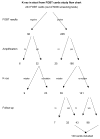Detecting K-ras mutations in stool from fecal occult blood test cards in multiphasic screening for colorectal cancer
- PMID: 17349741
- PMCID: PMC2712669
- DOI: 10.1016/j.canlet.2007.01.023
Detecting K-ras mutations in stool from fecal occult blood test cards in multiphasic screening for colorectal cancer
Abstract
Fecal occult blood testing (FOBT) is proven an efficient way of reducing mortality from colorectal cancer but has a relatively low positive predictive value (PPV). This study evaluated the ability to detect K-ras mutations in stool DNA from FOBT cards and to improve the PPV of the screening process. Two hundred and five consecutive positive FOBT cards and an arbitrary sample of 38 negative cards from a population-based screening program were included. K-ras mutations in FOBT card stool were sought using allele-specific hybridization. DNA was successfully amplified from 87.2% of cards. In 130 cases with positive FOBT and amplifiable DNA 23 malignancies and 25 adenomas were detected. In 34.8% of the malignancies, a mutation in K-ras was detected. The PPV for malignancies increased from 17.7% (all positive cards) to 60.0% if cards with four or more fields were positive and K-ras was positive (RR=2.66, 95% CI: 1.2-6.1). Testing for K-ras mutations in DNA extracted from stool from positive FOBT cards is feasible. Sequential detection of cancer-associated genetic markers from FOBT-based stool samples may potentially help separate true from false positives in a FOBT-based screening process.
Figures
Similar articles
-
Fecal occult blood test for colorectal cancer screening: an evidence-based analysis.Ont Health Technol Assess Ser. 2009;9(10):1-40. Epub 2009 Sep 1. Ont Health Technol Assess Ser. 2009. PMID: 23074514 Free PMC article.
-
Early Detection of Colorectal Cancer: a Multi-Center Pre-Clinical Case Cohort Study for Validation of a Combined DNA Stool Test.Clin Lab. 2018 Oct 1;64(10):1719-1730. doi: 10.7754/Clin.Lab.2018.180521. Clin Lab. 2018. PMID: 30336540
-
Results of National Colorectal Cancer Screening Program in Croatia (2007-2011).World J Gastroenterol. 2012 Aug 28;18(32):4300-7. doi: 10.3748/wjg.v18.i32.4300. World J Gastroenterol. 2012. PMID: 22969192 Free PMC article.
-
Utilization of K-ras mutations identified in stool DNA for the early detection of colorectal cancer.J Cell Biochem Suppl. 2000;34:35-9. doi: 10.1002/(sici)1097-4644(2000)77:34+<35::aid-jcb8>3.0.co;2-w. J Cell Biochem Suppl. 2000. PMID: 10762013 Review.
-
Options for screening for colorectal cancer.Scand J Gastroenterol Suppl. 2003;(237):13-6. doi: 10.1080/00855910310001421. Scand J Gastroenterol Suppl. 2003. PMID: 12797674 Review.
Cited by
-
A complex microsatellite at chromosome 7q33 as a new prognostic marker of colorectal cancer.Oncotarget. 2017 Sep 16;8(51):88760-88769. doi: 10.18632/oncotarget.21077. eCollection 2017 Oct 24. Oncotarget. 2017. PMID: 29179473 Free PMC article.
-
Implications of new colorectal cancer screening technologies for primary care practice.Med Care. 2008 Sep;46(9 Suppl 1):S138-46. doi: 10.1097/MLR.0b013e31818192ef. Med Care. 2008. PMID: 18725826 Free PMC article. Review.
References
-
- Mandel JS, Bond JH, Church TR, et al. Reducing mortality from colorectal cancer by screening for faecal occult blood. N Engl J Med. 1993;328:1365–1371. - PubMed
-
- Mandel JS, Church TR, Ederer F, Bond JH. Colorectal cancer mortality: Effectiveness of biennial screening for fecal occult blood. J Natl Cancer Inst. 1999;91:434–437. - PubMed
-
- Hardcastle JD, Chamberlain JO, Robinson MHE, et al. Randomised controlled trial of faecal occult blood screening for colorectal cancer. Lancet. 1996;348:1472–1477. - PubMed
-
- Kronborg O, Fenger C, Olsen J, Jorgensen OD, Sondergaard O. Randomised study of screening for colorectal cancer with faecal occult blood test. Lancet. 1996;348:1467–1471. - PubMed
-
- Rennert G. Fecal Occult Blood (FOB) Screening – Trial evidence, Practice and Beyond. Recent Results in Cancer Research. Tumor Prevention and Genetics. 2003;163:248–253. - PubMed
Publication types
MeSH terms
Grants and funding
LinkOut - more resources
Full Text Sources
Other Literature Sources
Medical
Miscellaneous


